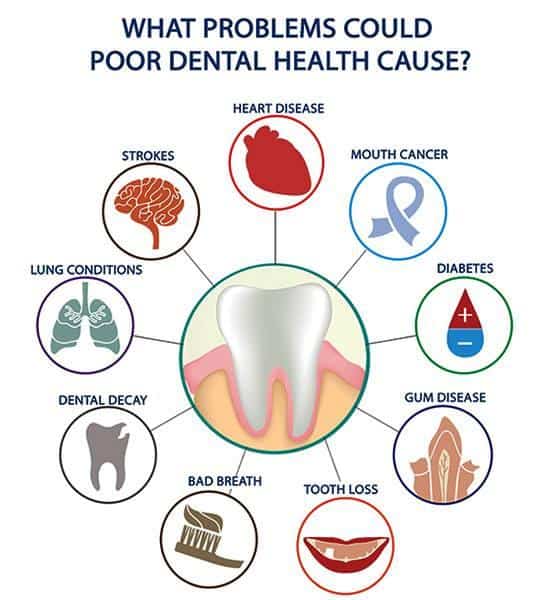https://naenaedentalclinic.co.nz/blog/the-importance-of-oral-health/
Imagine a world where everyone has a bright smile, free from any dental issues or discomfort. It may seem like a dream, but the reality is that maintaining good oral health is crucial to our overall well-being. From preventing tooth decay and gum disease to improving our confidence and quality of life, the importance of oral health cannot be overstated. In this article, we will explore the various reasons why oral health matters and how we can take proactive steps to ensure our mouths stay healthy and happy. 
The Connection between Oral Health and Overall Health
The Link between Gum Disease and Chronic Conditions
Taking care of your oral health goes beyond just having a bright smile and fresh breath. Research has shown a clear link between gum disease, also known as periodontal disease, and various chronic conditions. Gum disease is an inflammation of the gums caused by the buildup of plaque, a sticky film of bacteria that forms on your teeth. If left untreated, gum disease can lead to tooth loss and even affect your overall health. Studies have found that gum disease is associated with an increased risk of developing chronic conditions such as heart disease, diabetes, respiratory infections, and even certain types of cancer. This connection may be attributed to the fact that the bacteria from gum disease can enter your bloodstream and travel to other parts of your body, causing inflammation and damage.The Impact of Poor Oral Health on Heart Health
Maintaining good oral health is vital for a healthy heart. Poor oral hygiene can lead to the accumulation of bacteria in your mouth, particularly in the gums. These bacteria can then enter your bloodstream and cause inflammation, which may contribute to the development of cardiovascular diseases such as heart disease, clogged arteries, and even heart attacks. Research has shown that individuals with gum disease are more likely to have heart problems compared to those with healthy gums. Inflammation in the gums can cause inflammation throughout the body, including the arteries, leading to the narrowing and hardening of blood vessels. This can restrict blood flow to the heart and increase the risk of a heart attack or stroke.The Relationship between Oral Health and Diabetes
If you have diabetes, it is crucial to pay extra attention to your oral health. Diabetes can weaken your body’s ability to fight off infections, including infections in the gums. When your blood sugar levels are not well controlled, it can lead to high glucose levels in your saliva, creating an ideal environment for bacteria to grow and thrive. Individuals with diabetes are more susceptible to developing gum disease, and gum disease, in turn, can make it more difficult for diabetics to control their blood sugar levels. The two conditions have a reciprocal relationship, with gum disease possibly worsening diabetes control and diabetes increasing the risk of gum disease.The Connection between Oral Health and Respiratory Health
Maintaining good oral health is not only important for your teeth and gums but also for your respiratory health. Poor oral hygiene can lead to an overgrowth of bacteria in your mouth, which can be inhaled into your lungs and cause respiratory infections such as pneumonia. Bacteria in the mouth can travel through the respiratory tract and reach the lungs, where they can cause inflammation and infection. This is particularly problematic for individuals with pre-existing respiratory conditions such as asthma or chronic obstructive pulmonary disease (COPD), as they are already more susceptible to respiratory infections.The Importance of Good Oral Hygiene Practices
The Basics of Good Oral Hygiene
Practicing good oral hygiene is essential for maintaining healthy teeth and gums. It involves a regular routine of brushing your teeth, flossing, and using mouthwash. Brush your teeth at least twice a day using a soft-bristled toothbrush and fluoride toothpaste. Make sure to brush all surfaces of your teeth, including the front, back, and chewing surfaces. Flossing is equally important as it helps remove plaque and food particles that may be trapped between your teeth and along the gumline. Use a gentle sawing motion to move the floss up and down between each tooth. Don’t forget to rinse your mouth with an antimicrobial mouthwash to kill any remaining bacteria and freshen your breath.The Role of Brushing and Flossing in Maintaining Oral Health
Brushing and flossing are the cornerstones of a good oral hygiene routine. Brushing your teeth helps remove plaque and bacteria from the surfaces of your teeth, while flossing removes plaque and food particles from between your teeth and along the gumline. By brushing and flossing regularly, you can prevent the buildup of plaque, which can eventually harden into tartar and cause gum disease. Additionally, brushing and flossing can help prevent tooth decay, bad breath, and other dental problems.The Importance of Regular Dental Check-Ups
In addition to maintaining a good oral hygiene routine at home, regular dental check-ups are crucial for maintaining optimal oral health. Your dentist can detect any issues early on and provide appropriate treatment before they worsen. During a dental check-up, your dentist will examine your teeth, gums, and other oral tissues. They may also take X-rays to check for any hidden problems such as cavities or bone loss. Professional cleanings will also be done to remove any tartar or plaque that cannot be removed through regular brushing and flossing.The Benefits of Professional Teeth Cleaning
Even with regular brushing and flossing, some plaque and tartar may still accumulate on your teeth. These deposits can only be effectively removed through professional teeth cleaning done by a dental hygienist or dentist. Professional teeth cleaning involves scaling and polishing your teeth to remove any plaque, tartar, and stains. This process not only helps keep your teeth clean and bright but also plays a significant role


